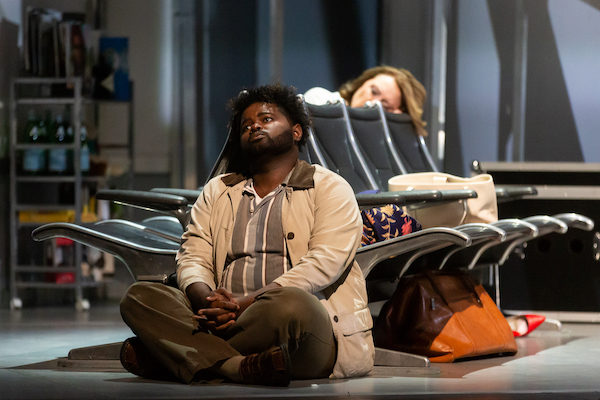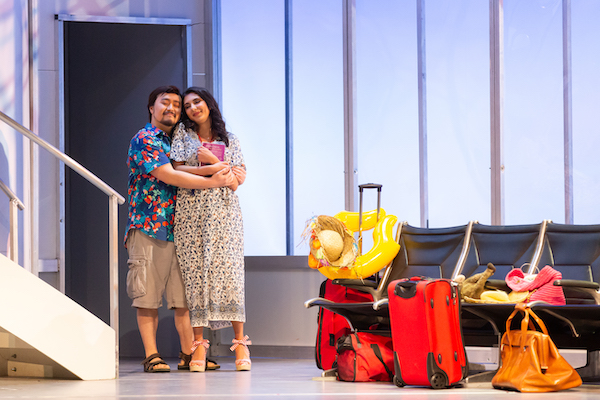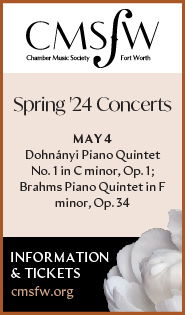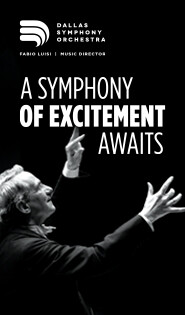Holiday and Martin soar in Dallas Opera’s engaging first “Flight”

With their 1998 opera Flight, composer Jonathan Dove and librettist April de Angelis managed to turn one of modern life’s most prosaic settings — the airport terminal — into a place of imagination and intrigue. But they had help: Their taut, compact musical drama about a day in the lives of a handful of would-be travelers, and one stranded refugee, was based on a strange true story.
Flight is inspired by the saga of Mehran Karimi Nasseri, an Iranian man who spent 18 years living in Charles de Gaulle Airport in France, unable — and later unwilling — to leave the terminal amid a dispute over his citizenship. (He left in 2006 upon being hospitalized and now reportedly lives in a Paris shelter.) The story was also fictionalized in Steven Spielberg’s 2004 film, The Terminal, starring Tom Hanks.
In the production of Flight that had its Dallas Opera premiere on Friday night, the Refugee is voiced by countertenor John Holiday, whose performance alone is worth the price of admission. Costumed in a middle-aged man’s uniform of khaki trousers and a field jacket, Holiday belies that ordinariness of dress with the extraordinariness of his voice, which is both pure and remarkably warm.
In Act 1 the Refugee shares his feelings about the transit hub that has become his entire world with the character of the Controller, sung by soprano Abigail Rethwisch, who shows ample and able upper range here. She likes the airport when it’s early and quiet; he prefers having people around.
He soon gets his wish, as travelers arrive apace with stories and complications of their own.
Married couple Bill and Tina, sung by tenor Andrew Stenson and soprano Elena Villalón, are en route to a vacation they hope will revive their flagging marriage. Stenson’s tenor is pleasant enough, but Villalón’s voice is remarkable for such a young singer — she is still in her early 20s, but her instrument is supple, liquid, and warm.

A heavily pregnant Minskwoman and her diplomat husband, Minskman, are headed to a new diplomatic assignment. Bass-baritone Seth Carico as Minskman is bullish about this career move. The outstanding mezzo-soprano Catherine Martin as Minskwoman is less certain. Martin, a University of North Texas product, has a lush, delicious voice that would be worth hearing in any imaginable repertoire.
The audience meets an Older Woman and soon learns that she is not planning to travel at all. Sung by mezzo-soprano Deanne Meek, she discloses her anxieties about meeting up with her much younger fiancé, who has sent her a postcard letting her know that he will be at the airport on Wednesday — but which Wednesday? So she arrives, and waits, and sings. Meek’s contralto is rich and blends beautifully with the ensemble.
Mezzo-soprano Kristen Choi and baritone Will Liverman, as a Stewardess and a Steward, arrive singing about the challenges of their jobs — the constant smiling — and their lust for each other. Their voices in particular blended ably, with Choi’s sparkle complementing Liverman’s silken creaminess.
One challenge of this staging is that with few exceptions, including the Immigration Officer sung by the smoky-voiced bass-baritone Zachary James, all of the singers spend nearly the entire two and a half hours of the performance on stage. But all handled the demands, sounding as strong in the third act as the first. The staging does give most singers vocal rests, though, and sometimes literal ones, with more on-stage napping than probably any other opera, when all the denizens of the terminal are stranded by a storm in Act II.
Ostensibly a comedy, Flight doesn’t shy from taboos. In the best-sung aria of the evening, Martin’s Minskwoman sings movingly of her ambivalence and even her dread of impending motherhood. Gesturing to a leather satchel, she relates that she bought it on a trip to New York to hold a cashmere sweater and a Gucci dress, but now it contains the trappings of her life’s next chapter: a stuffed toy, baby clothes, cotton balls.
As with the airport setting, this is not the usual opera subject matter, and that’s part of what makes Flight so powerful. It’s also the result, no doubt, of having a female librettist writing lines for women singers. (The production also features more partial nudity and depictions of sex than opera audiences may be used to.)
In the third act, James’s Immigration Officer catches the Refugee, who in turn reveals how he came to be trapped in the terminal, and the plot takes a jarring turn that will resonate with anyone who watched with horror as desperate Afghans tried to cling to departing American military planes.
The Dallas Opera orchestra, under the baton of Emmanuel Villaume, performed the difficult, minimalist-infused score with finesse. Sets by R. Keith Brumly featured a realistic terminal below a soaring air traffic control tower and clever details like electronic boards for flight announcements and, at one point when the group enacts a spontaneous luau, hovering pineapples. Jonathan Knipscher’s costumes astutely reflected the anxieties of each character: Tina’s wrap dress and wedges over a bikini and the Older Woman’s mixed prints, trying too hard; the Minskwoman’s navy maternity dress, not trying quite hard enough.
While there are some issues with tone in the libretto, overall the opera is a joy and worth seeing even just for Holiday and Martin.
The opera repeats at 2 p.m. on March 6 and 7:30 p.m. March 9 and 12. dallasopera.org


